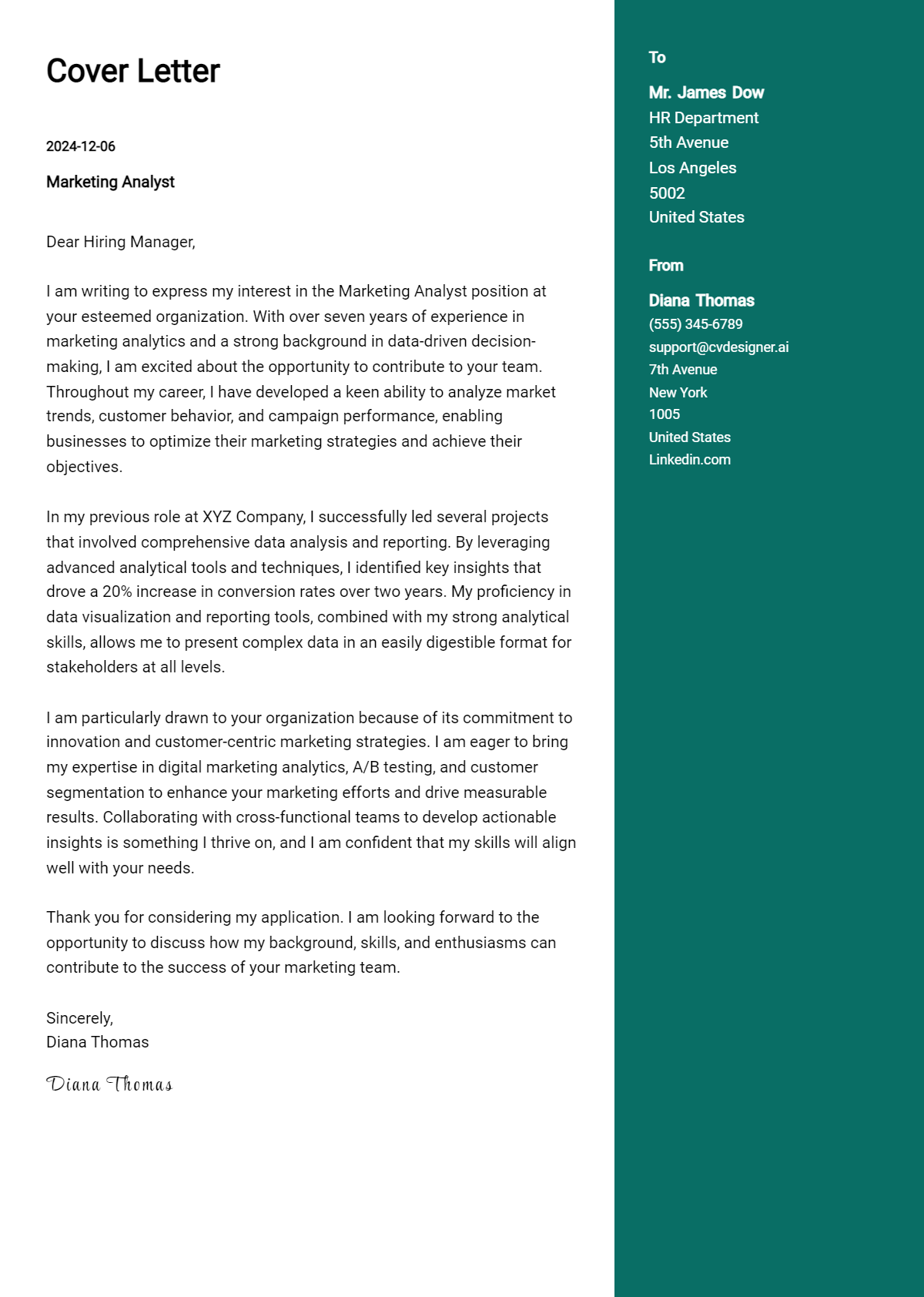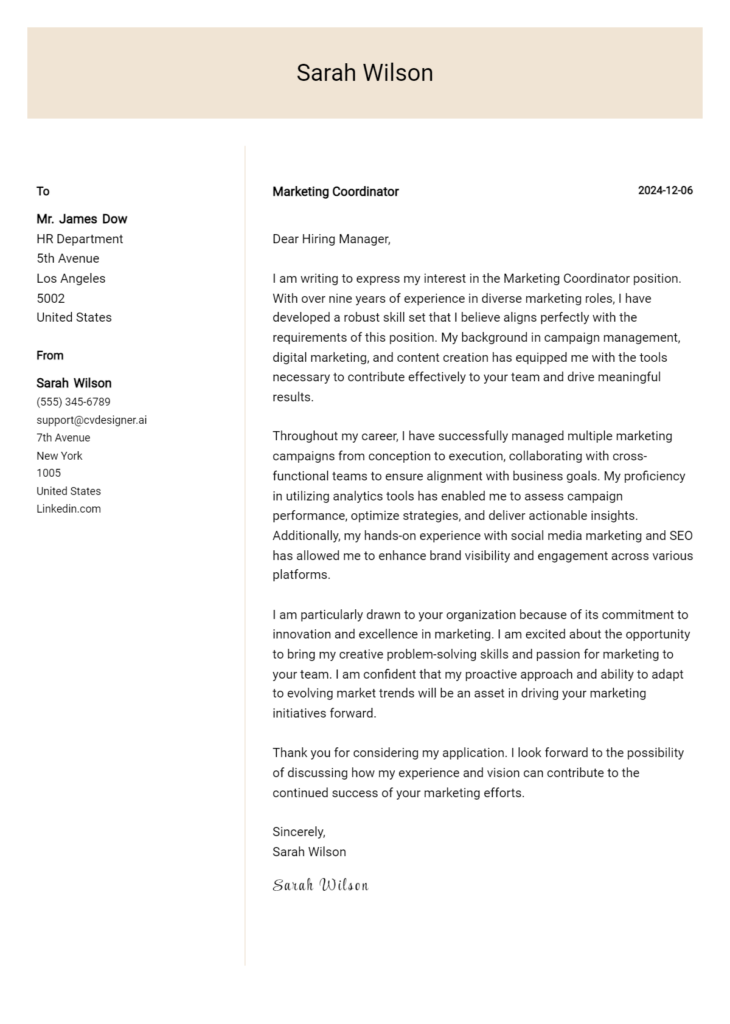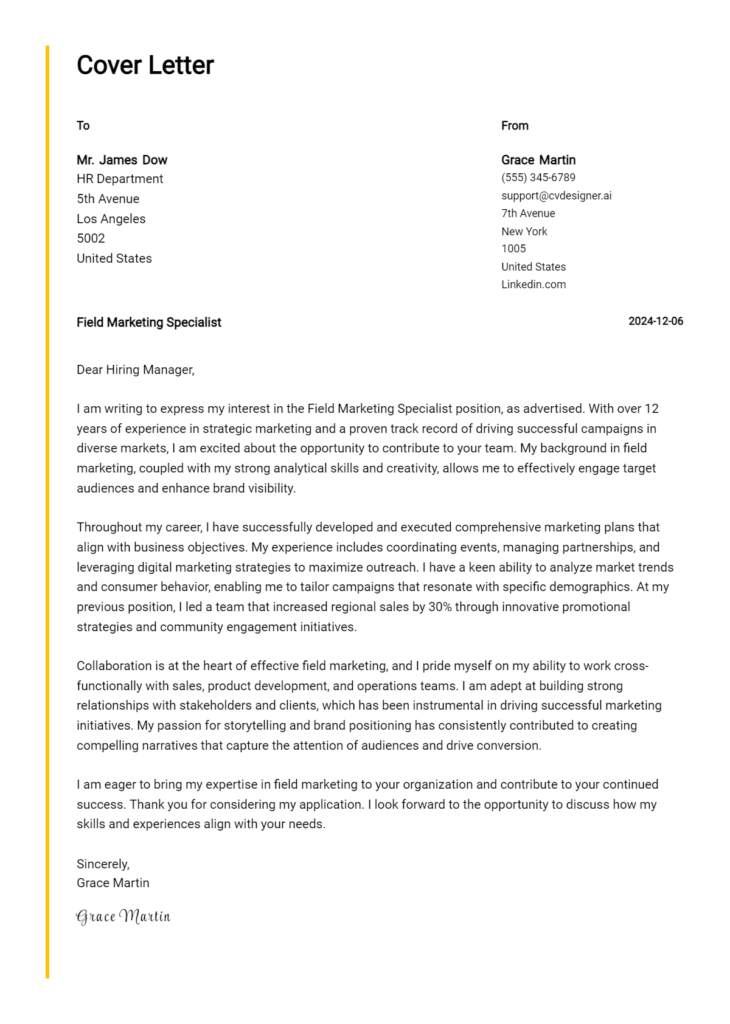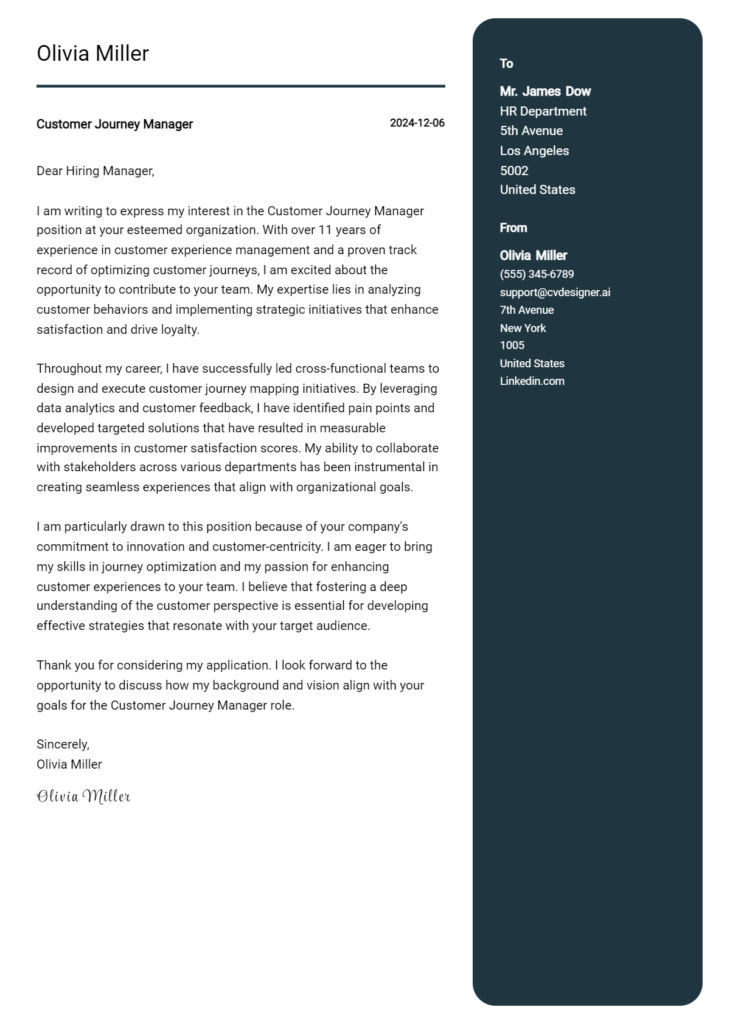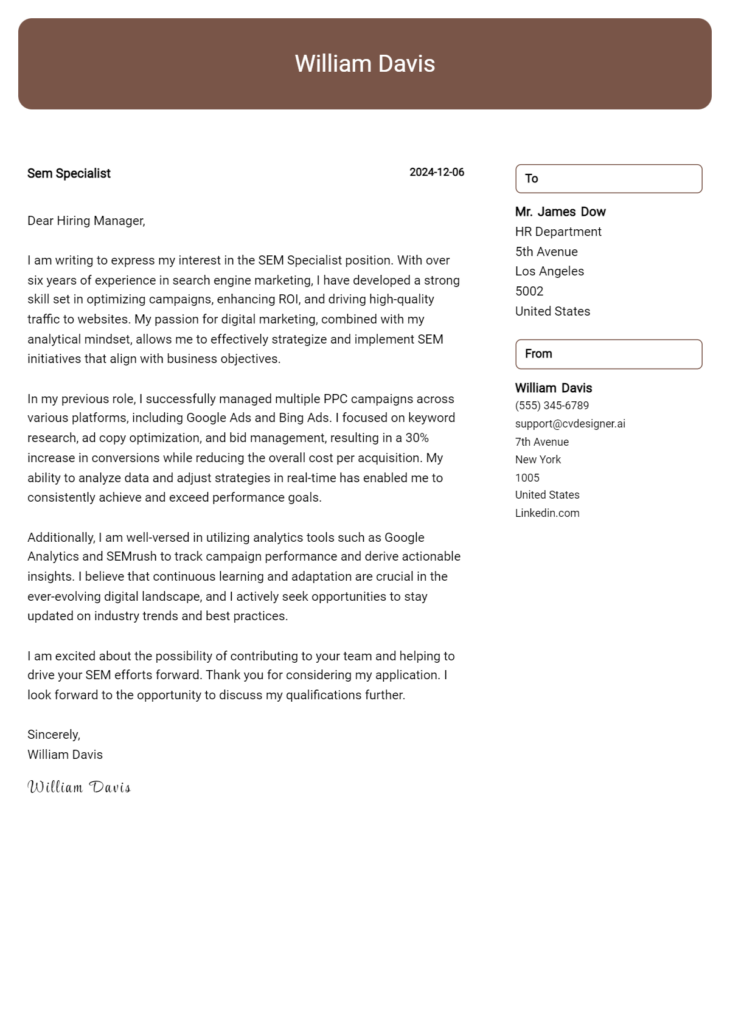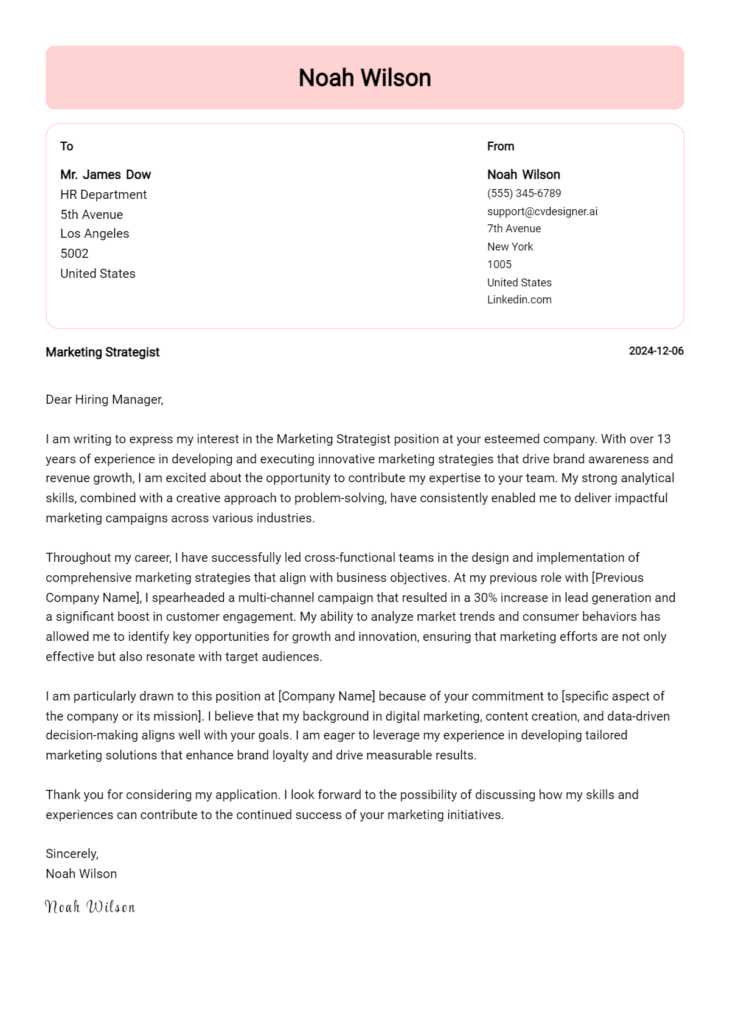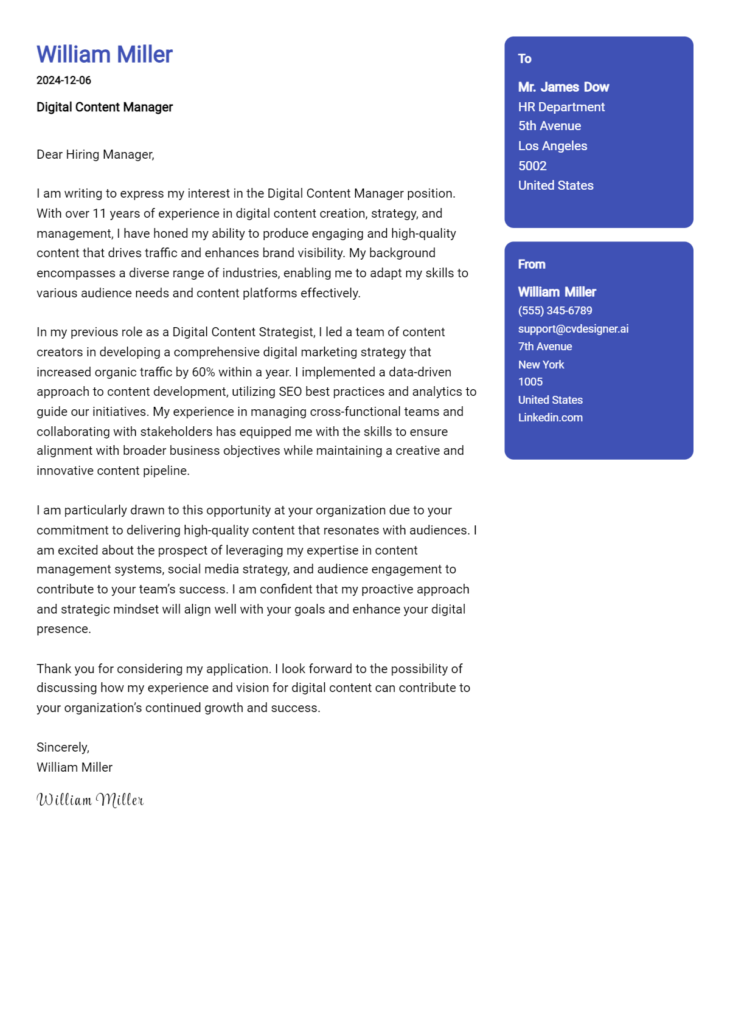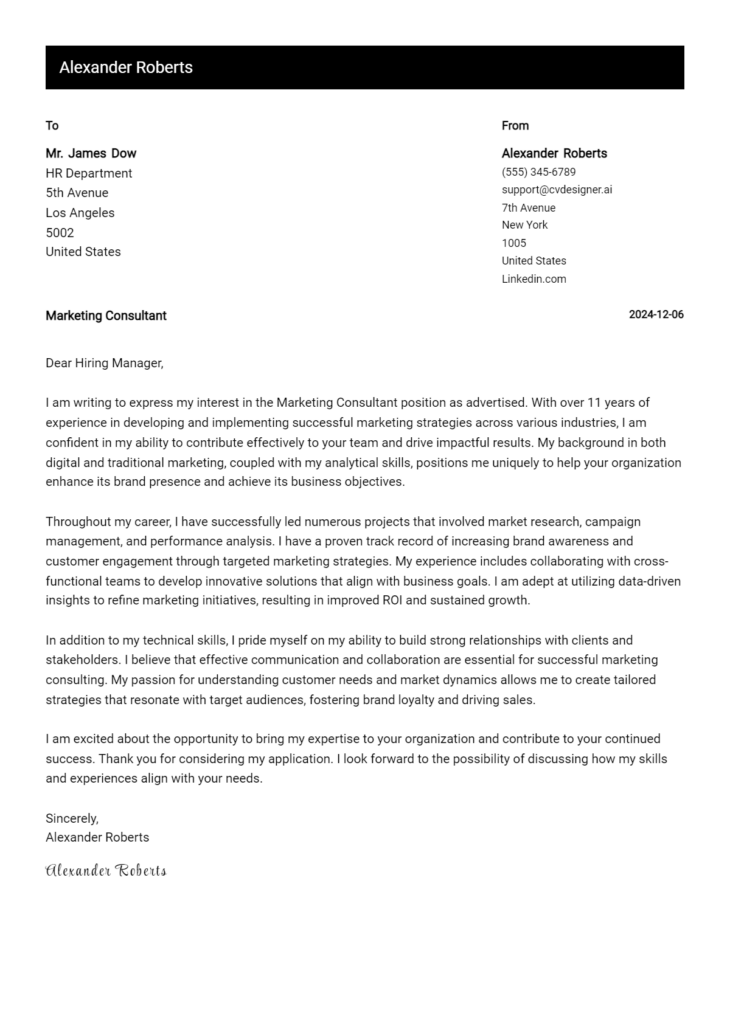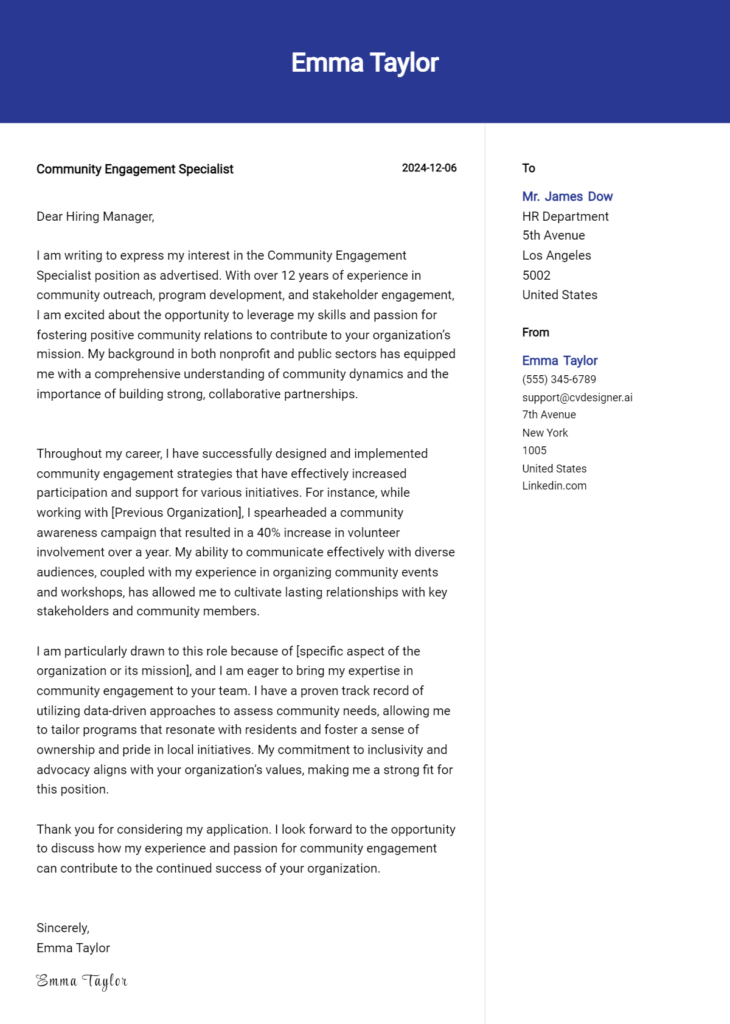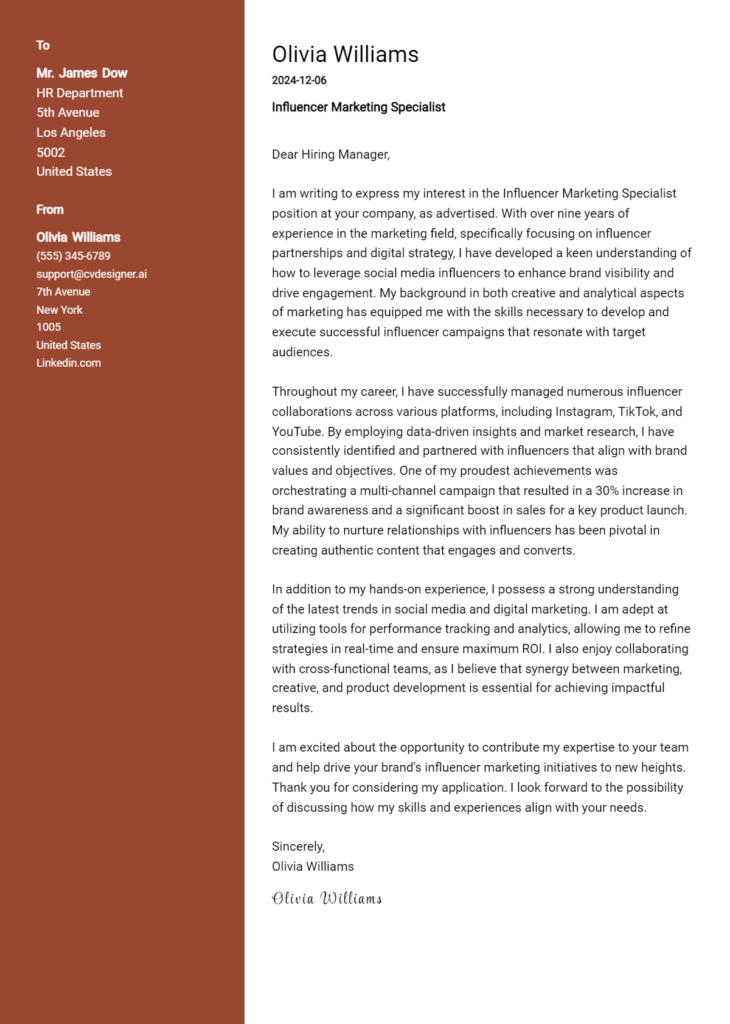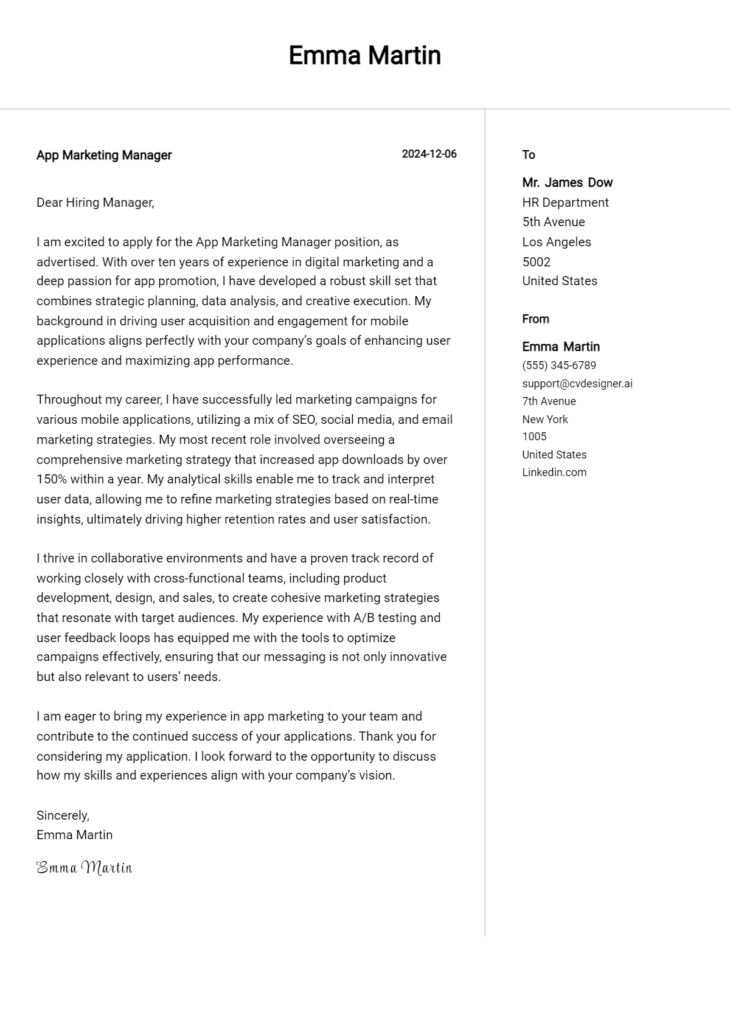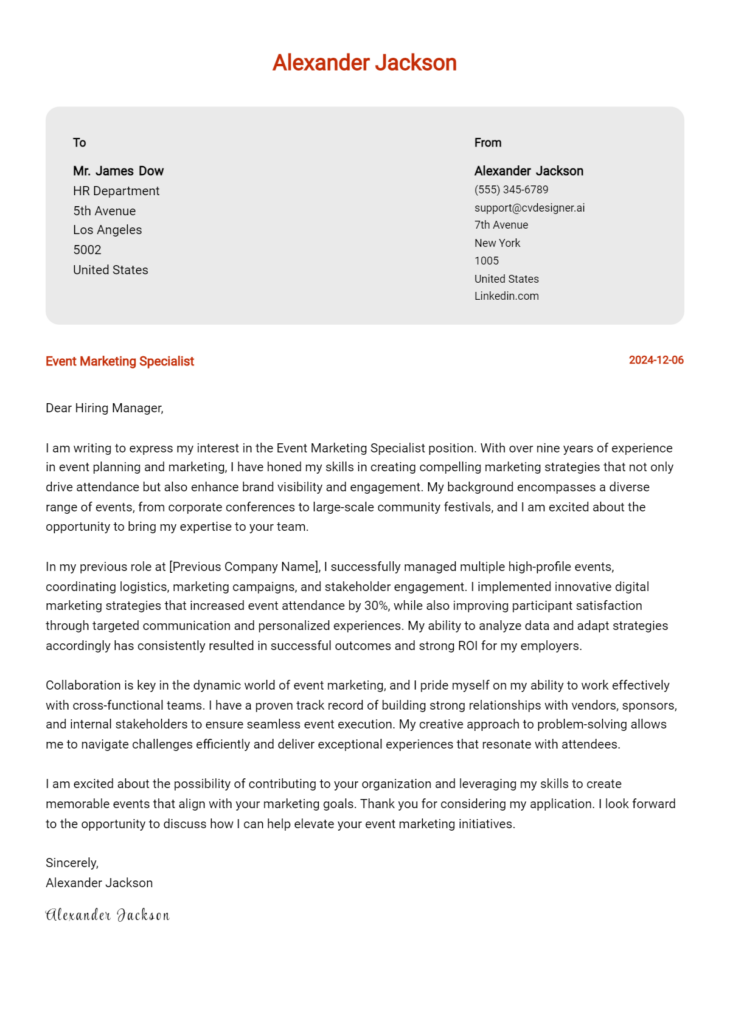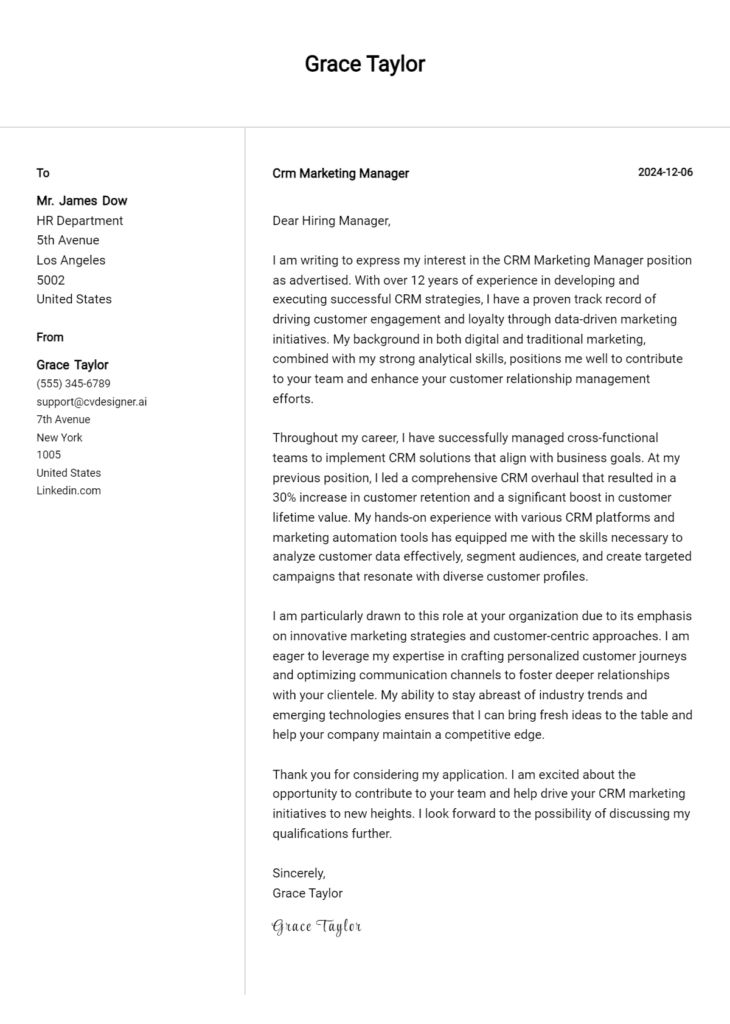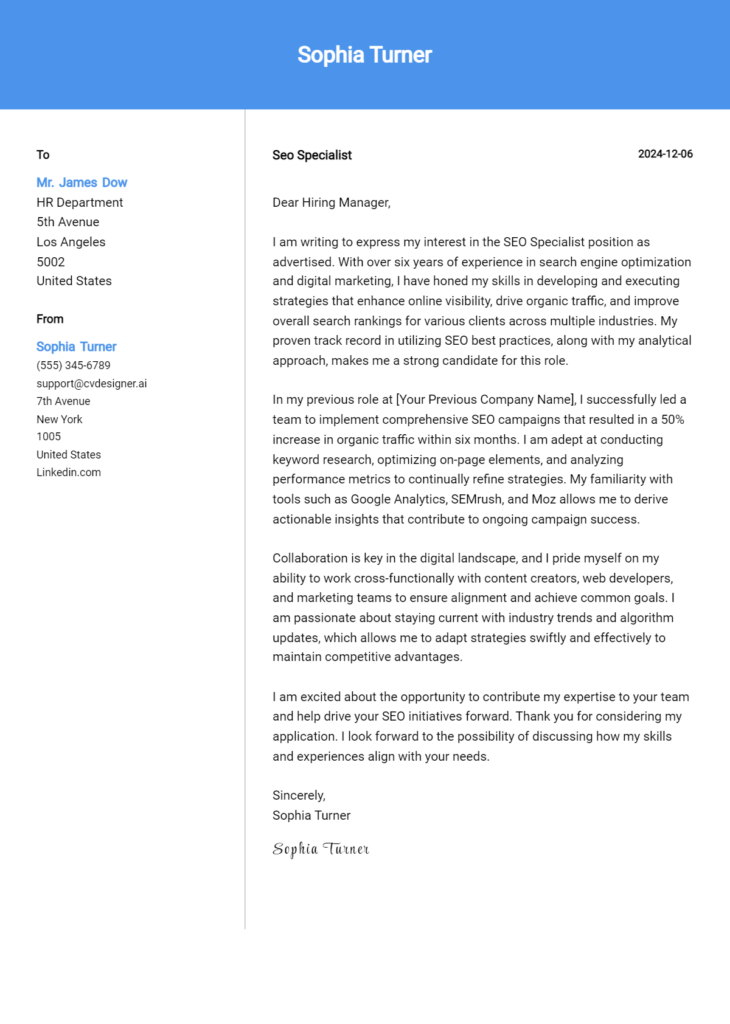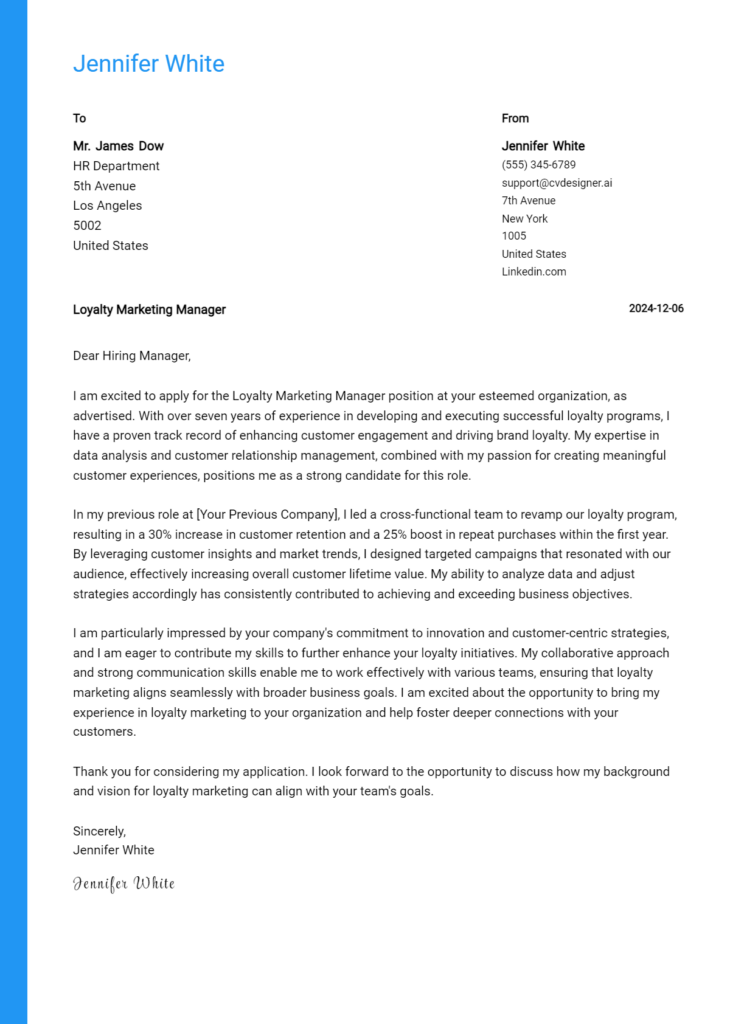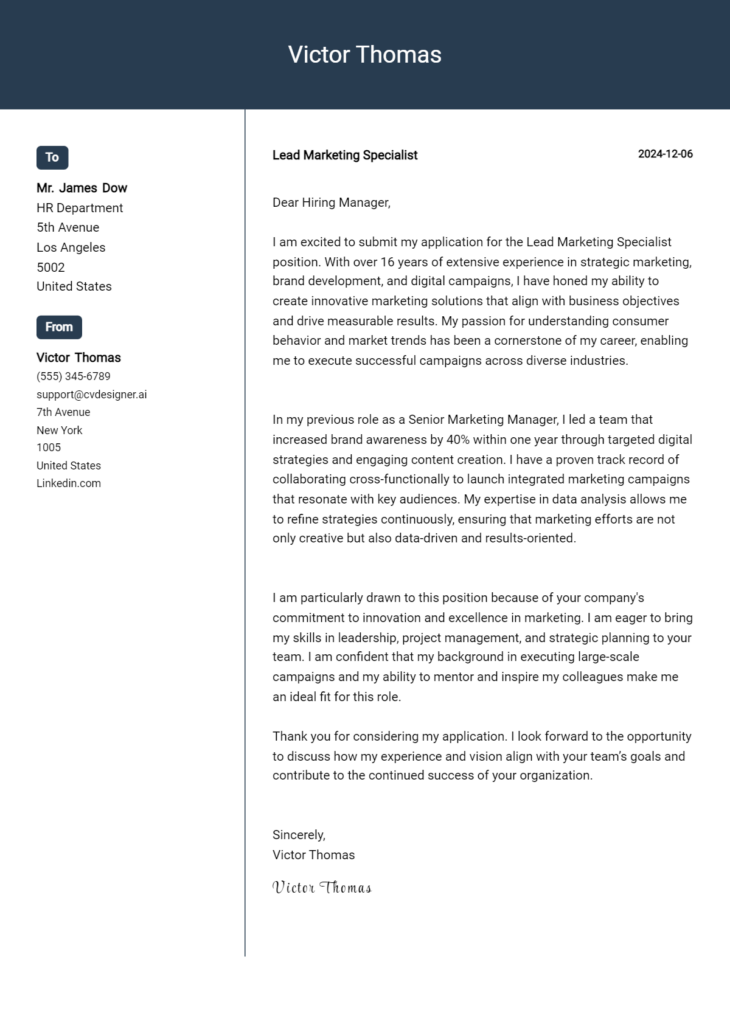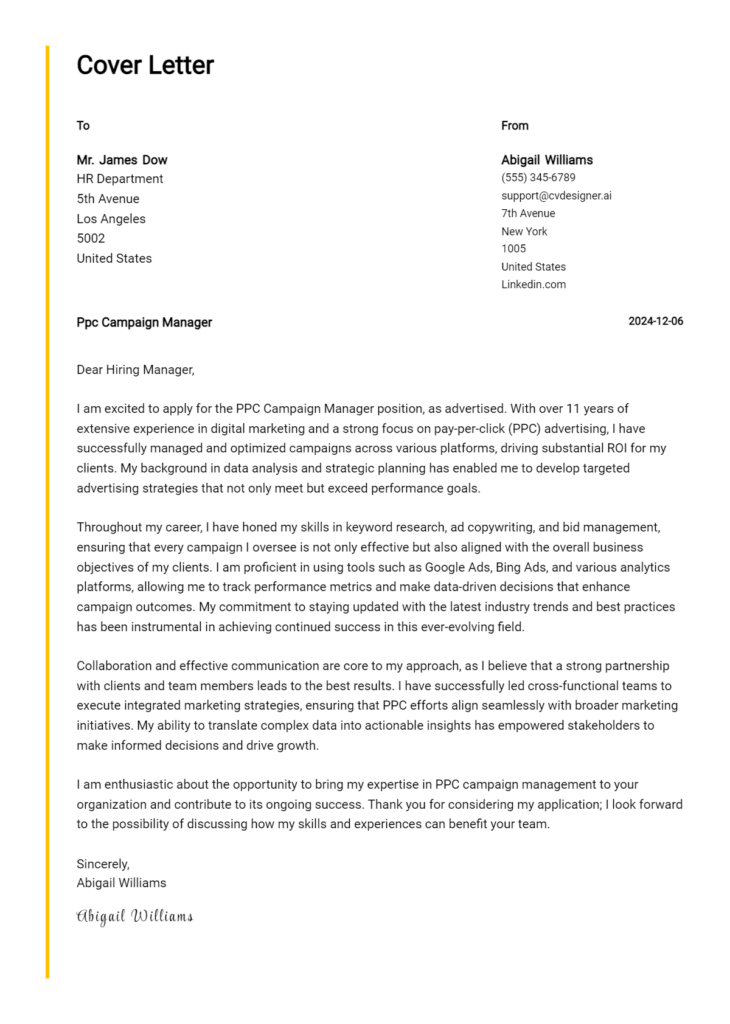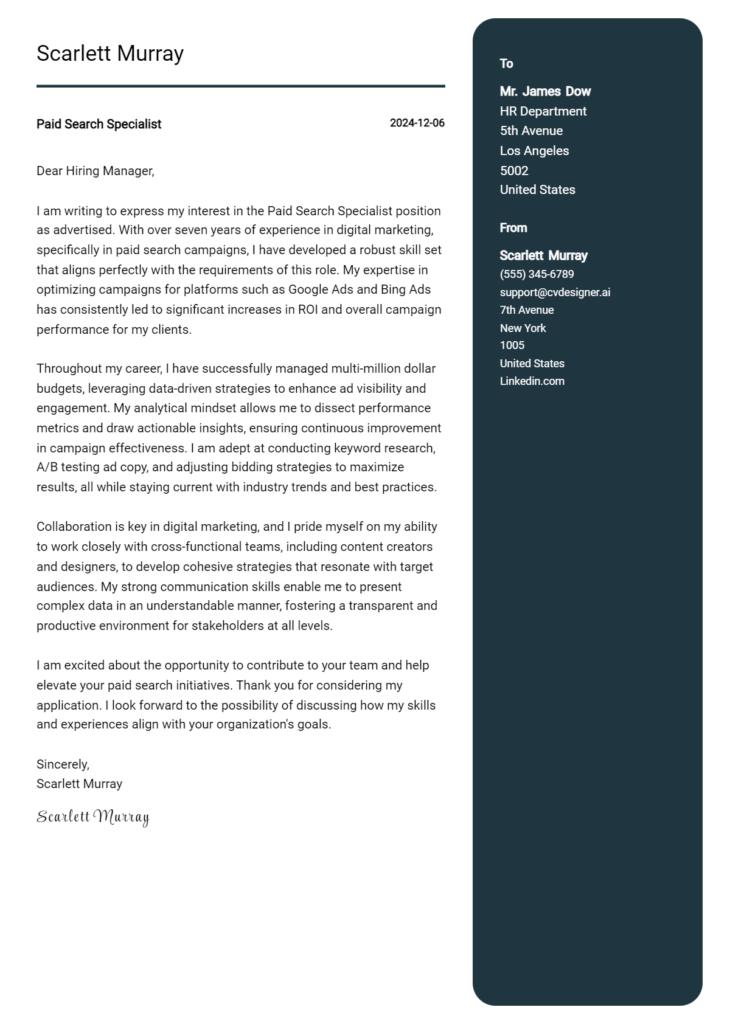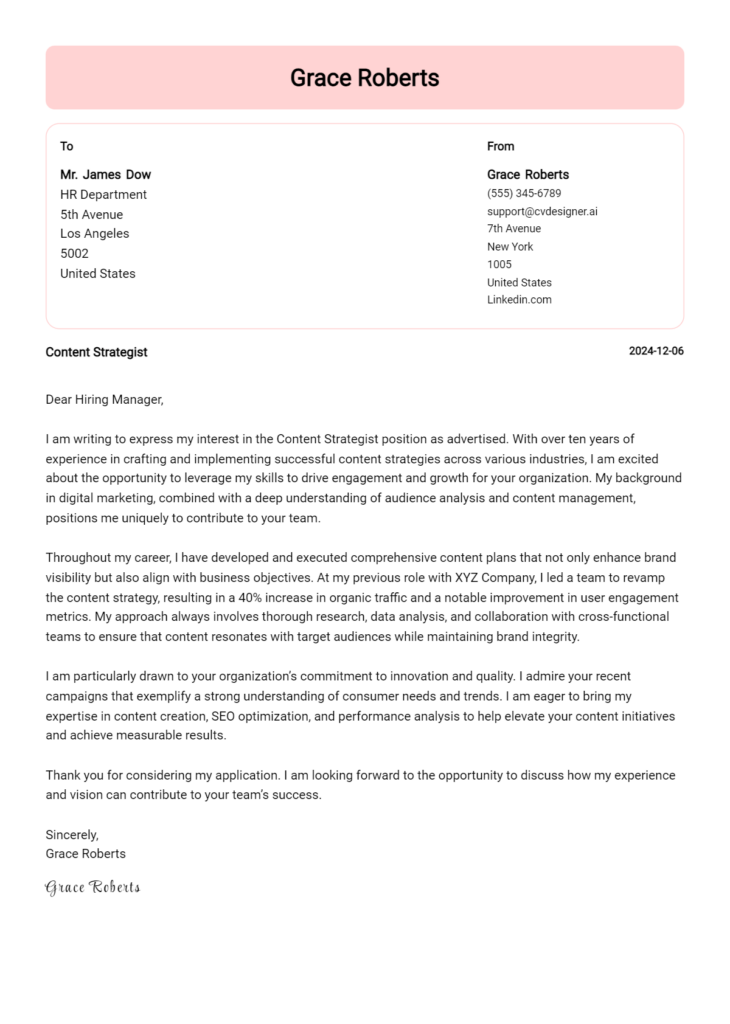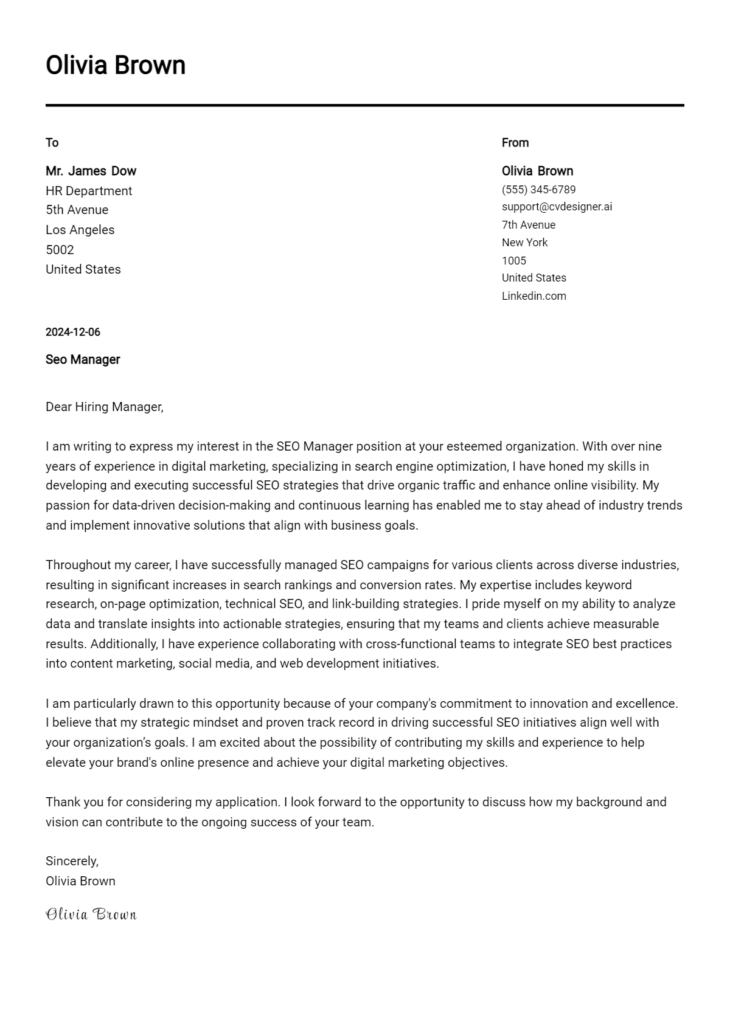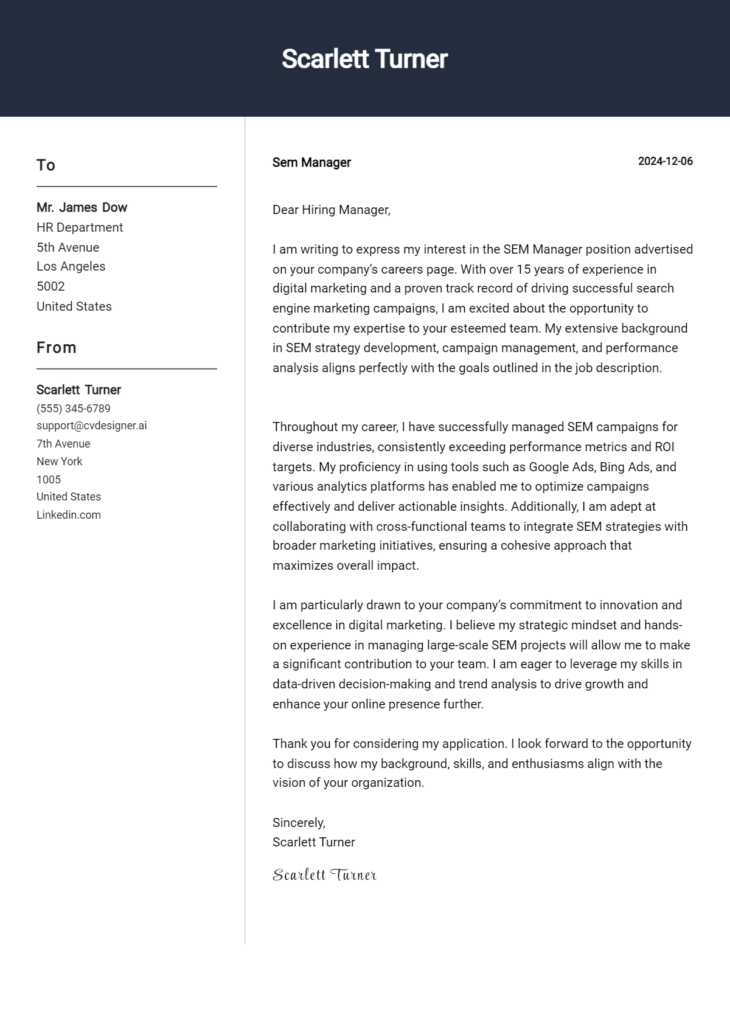Marketing Analyst Cover Letter Examples
Explore additional Marketing Analyst cover letter samples and guides and see what works for your level of experience or role.
How to Format a Marketing Analyst Cover Letter?
Crafting an effective cover letter is essential for a Marketing Analyst, as it serves as your first opportunity to demonstrate your analytical prowess and strategic thinking. The way you format your cover letter can significantly impact the hiring manager's perception of your attention to detail and ability to communicate effectively—both of which are crucial in the marketing field. A well-structured cover letter not only showcases your qualifications but also reflects your understanding of marketing principles and trends.
In this guide, we will outline the key components of a professional cover letter, providing valuable insights and marketing-specific examples to help you create a persuasive document.
We will focus on the essential sections of a cover letter, including:
- Cover Letter Header
- Cover Letter Greeting
- Cover Letter Introduction
- Cover Letter Body
- Cover Letter Closing
Each section is pivotal in presenting your skills and professionalism. Let’s delve into each part to understand how to make your Marketing Analyst cover letter stand out.
The Importance of the Cover Letter Greeting for a Marketing Analyst
The greeting of your cover letter plays a crucial role in setting the tone for the rest of your application. It serves as the first impression you make on the hiring manager, demonstrating your professionalism and attention to detail. Addressing the hiring manager directly personalizes your letter, making it clear that you have a genuine interest in the position and the company. To avoid sounding generic, take the time to research the recipient's name and title whenever possible. A personalized greeting not only showcases your initiative but also establishes a connection with the reader.
When crafting your greeting, strive to use specific names instead of vague titles. For example, instead of "Dear Hiring Manager," you might find the name of the person responsible for hiring, which will make your application stand out.
Strong Greeting Example
Dear Ms. Johnson,
Weak Greeting Example
To Whom It May Concern,
Cover Letter Introduction for Marketing Analyst
A well-crafted cover letter introduction is crucial for a Marketing Analyst as it sets the tone for the entire application. This opening paragraph serves as the first impression, capturing the hiring manager's attention and clearly expressing the candidate’s enthusiasm for the role. An effective introduction should also succinctly highlight key skills or significant achievements that align with the job description, demonstrating the candidate's suitability for the position. Below are examples of both strong and weak introductions to illustrate the difference.
Strong Example
Dear [Hiring Manager's Name], I am excited to apply for the Marketing Analyst position at [Company Name], where I can leverage my five years of experience in data-driven marketing strategies to enhance brand visibility and drive customer engagement. My recent project involved a comprehensive analysis of consumer behavior that resulted in a 20% increase in conversion rates for a major campaign. I am eager to bring my analytical skills and passion for market research to your innovative team, contributing to [Company Name]'s success.
Weak Example
To Whom It May Concern, I am writing to apply for the Marketing Analyst role. I have some experience in marketing and think this job looks interesting. I hope to use my skills to help your company, but I am not sure what projects you are currently working on.
Cover Letter Body for a Marketing Analyst
The body of a cover letter for a Marketing Analyst plays a crucial role in demonstrating the candidate's analytical skills, relevant experiences, and overall value to the prospective employer. It serves as a platform for the candidate to highlight specific projects or accomplishments that showcase their ability to drive data-driven decisions, optimize marketing strategies, and contribute to the organization's success. By detailing their proficiency in tools like Google Analytics, CRM software, or data visualization tools, the candidate can effectively communicate their technical and analytical capabilities. Additionally, mentioning quantifiable results from past marketing campaigns or research projects can further reinforce their qualifications and potential impact within the company.
Strong Example
During my previous role as a Marketing Analyst at XYZ Corp, I led a project that analyzed customer behavior data, which resulted in a 20% increase in our email campaign engagement rates. By employing advanced segmentation techniques and A/B testing, I was able to identify key demographics that responded positively to targeted messaging. Furthermore, my proficiency in tools such as Tableau and Google Analytics allowed me to present actionable insights to the marketing team, ultimately guiding our strategy and enhancing campaign performance. I believe that my data-driven approach and dedication to continuous improvement would greatly contribute to your team at ABC Company.
Weak Example
I have worked in marketing for a while and have some experience with data analysis. I think I can help your company because I am good with numbers. In my last job, I did some reports which were okay. I am interested in working at your company because it seems like a good place to be.
Importance of the Cover Letter Closing for a Marketing Analyst
The closing paragraph of a cover letter is crucial as it serves to summarize your qualifications, reiterate your interest in the position, and encourage the hiring manager to take the next steps, such as reviewing your resume or scheduling an interview. A strong closing leaves a lasting impression, reinforcing your suitability for the Marketing Analyst role and expressing enthusiasm for the opportunity. In contrast, a weak closing may fail to convey your eagerness or confidence, potentially leaving the reader with doubts about your fit for the position.
Strong Example
Thank you for considering my application for the Marketing Analyst position at [Company Name]. With my background in data analysis and experience in developing successful marketing strategies, I am excited about the opportunity to contribute to your team. I believe my skills can help drive impactful campaigns and support your company's growth objectives. I look forward to the possibility of discussing my application in more detail and am eager to explore how I can add value to your organization. Please feel free to review my resume, and I hope to hear from you soon to schedule an interview.
Weak Example
Thanks for reading my letter. I think I might be a good fit for the Marketing Analyst role. I hope you look at my resume and maybe we can talk later.
When applying for a Marketing Analyst position, crafting a compelling cover letter is essential to stand out from the competition. This document serves as your first impression, so it's crucial to effectively highlight your technical skills, problem-solving capabilities, knowledge of the Software Development Life Cycle (SDLC), teamwork experience, and a commitment to continuous learning. The following tips will guide you in creating an impactful cover letter that resonates with hiring managers.
Tips for Writing an Effective Cover Letter for a Marketing Analyst
Showcase Your Technical Skills
Begin your cover letter by emphasizing your technical skills relevant to the role. Mention specific tools and software you are proficient in, such as Google Analytics, SQL, or Tableau. Providing concrete examples of how you've utilized these tools in past projects can help illustrate your expertise and effectiveness.Demonstrate Problem-Solving Abilities
Marketing Analysts often face challenges that require innovative solutions. Share an example of a problem you encountered in a previous role and describe how you approached the situation. Highlight the analytical methods you used and the positive outcome that resulted from your efforts.Highlight SDLC Knowledge
If you have experience with the Software Development Life Cycle, be sure to include it in your cover letter. Explain how your understanding of SDLC processes has enabled you to collaborate effectively with technical teams. Mention specific projects where your knowledge contributed to successful outcomes.Emphasize Teamwork and Collaboration
Marketing is rarely a solo endeavor, so it’s important to convey your ability to work well in teams. Share examples of how you collaborated with cross-functional teams, such as marketing, sales, and product development. This illustrates your communication skills and ability to contribute to a unified goal.Express a Passion for Continuous Learning
The marketing landscape is constantly evolving. Convey your enthusiasm for staying updated with the latest trends and technologies by discussing any relevant courses, certifications, or conferences you've attended. This shows potential employers that you are proactive about your professional development and committed to bringing the latest insights to their team.
By following these tips, you can create a powerful cover letter that not only showcases your qualifications but also your enthusiasm for the Marketing Analyst position. For more guidance, consider exploring cover letter templates or utilizing a cover letter builder to streamline the writing process.
Common Mistakes to Avoid in a Marketing Analyst Cover Letter
Crafting a compelling cover letter is essential for standing out in the competitive job market for Marketing Analysts. Avoiding common mistakes can significantly enhance your chances of making a positive impression. Here are some pitfalls to steer clear of:
Generic Language: Using a one-size-fits-all approach can make your cover letter forgettable. Tailor your letter to the specific job and company to demonstrate your genuine interest.
Ignoring Formatting: A cluttered or unprofessional layout can detract from your message. Ensure that you follow a clear and professional cover letter format to enhance readability.
Focusing on Responsibilities Instead of Achievements: Employers want to see how you can add value. Highlight your accomplishments rather than just listing duties to showcase your skills effectively.
Overly Lengthy Letters: A long cover letter can lose the reader's attention. Keep it concise—ideally one page—to ensure your key points are easily digestible.
Typos and Grammatical Errors: Mistakes can undermine your professionalism. Always proofread your cover letter or use tools to check for errors before submission.
Lack of Keywords: Not incorporating relevant industry keywords can make your application less discoverable. Use terms from the job description to align your skills with the employer's needs.
Failing to Connect the Dots: Simply listing qualifications is not enough; you must explain how they relate to the position. Make connections between your experiences and the role to strengthen your case.
By avoiding these common mistakes and focusing on creating a tailored and error-free cover letter, you can increase your chances of landing an interview. For inspiration, check out these cover letter examples to help you craft your own.
Cover Letter FAQs for Marketing Analyst
What should I include in my cover letter for a Marketing Analyst position?
In your cover letter for a Marketing Analyst position, start with a strong introduction that specifies the role you’re applying for and where you found the job listing. Highlight your analytical skills, familiarity with data analytics tools, and experience with market research. Discuss specific projects you’ve worked on that illustrate your ability to derive insights from data and impact marketing strategies. Mention your proficiency in tools like Excel, Google Analytics, or Tableau, and any relevant certifications. Finally, express your enthusiasm for the company and how your skills align with their marketing goals.
How can I demonstrate my analytical skills in my cover letter?
To effectively demonstrate your analytical skills in your cover letter, provide concrete examples of projects where you successfully analyzed data to inform marketing decisions. For instance, you might describe how you conducted a customer segmentation analysis that improved targeting for a campaign, resulting in increased engagement or sales. Include metrics to quantify your impact, such as “Increased conversion rates by 20% through data-driven insights.” Using specific examples not only highlights your analytical capabilities but also showcases your results-oriented mindset, which is crucial for a Marketing Analyst role.
Should I tailor my cover letter for each application?
Yes, tailoring your cover letter for each application is essential. A customized cover letter allows you to align your skills and experiences with the specific requirements of the job and the company culture. Research the company’s recent marketing initiatives, values, and challenges to mention how your skills can address their needs. For instance, if the company recently launched a new product, you might discuss how your previous experience with product analysis could contribute to their marketing strategy. This personalized approach demonstrates your genuine interest in the role and sets you apart from generic applications.
How long should my cover letter be for a Marketing Analyst position?
Your cover letter for a Marketing Analyst position should ideally be one page long, consisting of three to four paragraphs. Aim for a concise and focused approach, typically ranging from 250 to 400 words. Begin with a brief introduction, followed by a paragraph that highlights your relevant skills and experiences. Use the next paragraph to provide specific examples of your analytical work and its impact. Finally, conclude with a strong closing statement that reiterates your interest in the role and invites further discussion. Keeping it concise ensures that your key points are easily digestible for hiring managers.
Build your Cover Letter in minutes
Use an AI-powered cover letter builder and have your letter done in 5 minutes. Just select your template and our software will guide you through the process.

